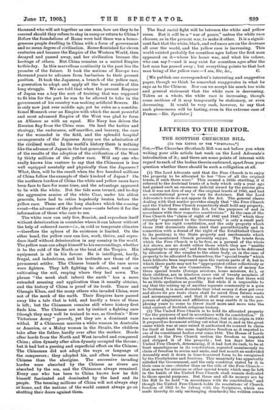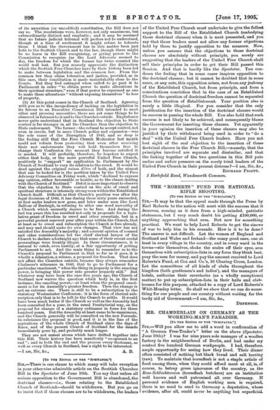LItTTIMS TO THE EDITOR.
THE SCOTTISH CHURCHES BILL.
[TO TIIR EDITOR OP waQPAT0h.•] SIR,—The Churches (Scotland) Bill was not before you when writing your able article last week on the Lord Advocate's introduction of it ; and there are some points of interest with regard to each of the bodies therein embraced, apart from your question whether there should be such a colligation at all.
(1) The Lord Advocate said that the Free Church is to enjoy the property to be allocated to her "free of all the original trusts, if such there were." This seemed a little startling, it it referred to the doctrinal trusts of a body which only a year ago had gained such an enormous judicial award by the precise plea that it was not free of any of the original trusts of 1848, and had no constitutional power to vary its doctrines. But the Lord Advocate's words do not appear in the Act. The general clause dealing with that matter provides simply that "the Free Church and the United Free Church respectively shall hold any property, allocated to them under this Act, for the purposes of and in accordance with their respective constitutions." In the case of the Free Church the "claim of right of 1842 and 1843," which they recently "represented to the Government," is only a small part of its now too rigid constitution, and the only property which those 1843 documents claim (and that parenthetically and in connection with a denial of the right of the Established Church to its position) is the State property and emoluments which the last-mentioned Church presently enjoys. The trusts from which the Free Church is to be free, as a perusal of the whole Act shows, are no doubt either those which they are "unable adequately to carry out," and from which they are to be delivered by allocation of the surplus to the other body, or, in the case of property to be allocated to themselves, the " special trusts " which have hitherto been impressed upon the various parts of it but to which these parts may not be " appropriated either collectively or severally" by the new Commission. The donors of money for these special trusts (foreign missions, home missions, etc.), or their children, are in nineteen cases out of twenty members of the United Free Church, and they no doubt hope that there will be as little spoliation as possible. But while it is impossible to say that the setting up of another separate community is a gain to Scotland, it is most desirable that what money it does get over and above its pro tents share shall be saved from future waste and mismanagement, and that it shall receive or retain such powers of adaptation and affiliation as may enable it in the per- plexing years to come to throw itself more and more into the vital current of Scottish religious history.
(2) The United Free Church is to hold its allocated property "for the purposes of and in accordance with its constitution." It has a complex and elaborate constitution ; but at its origin in 1900 it prepared no document setting out what that is, and in the great cause which was at once raised it authorised its counsel to claim for itself at least the same legislative freedom as it imputed to one of its constituent bodies ever since 1843. The House of Lords refused to the Free Church section the freedom so imputed and stripped it of the property ; but ten days later the United Free Church, determining, if it had lost its cash, to be at least unambiguous in its constitution, repeated unanimously its claim of freedom to revise and unite, and last month an undivided Assembly sent it down in time-honoured form to be recognised by the Presbyteries and Sessions. This unanimity has apparently satisfied the Government, and the only condition stated by it in their case is one—stricter than on the side of the Free Church— that money for missions or other special trusts which,nuty, be left in the hands of the United Free Church shall remain dedicated to those special purposes. But these and all its moneys are by the Bill to be held "in accordance with its constitution," and though the United Free Church holds its resolutions' of Church freedom of 1905 to be (along with the Scriptures, which are made thereby its only unchanging standards) the written centre
of its unwritten (or nncodified) constitution, the Bill does .not say so. The resolutions were, however, not only unanimous, but extraordinarily distinct and emphatic ; and it may be assumed that no future judicial tribunal will profess not to understand, though at a time of excitement it might refuse to tolerate them. I think the Government has in this matter been just both to the Scottish Church and to the law, though there might be no harm in the Bill recognising, or giving power to the Commission to recognise (as the Lord Advocate seemed to do), the freedom for which the former has twice counted the world well lost. But you scarcely appreciate the distinction which the Scottish Free Churches have by their history been led to make between legislation and the common law. From the common law they claim toleration and justice, provided, as in this case, their constitution is made unmistakably clear to the Courts. But they feel outraged when called to go past it to Parliament in order "to obtain power to make alterations in their spiritual structure," even if that power be expressed as one to make these alterations "without exposing themselves" to loss of property.
(3) At this point comes in the Church of Scotland. Agreeing with you as to the inexpediency of tacking on the legislation in its favour to an Executive Commission Bill intended to meet other and pressing necessities, there are yet some things to be observed in fairness to it and to the Churches outside. Englishmen never quite understand that in Scotland the objection to State control is far stronger in all the Churches than the objection to State endowment. The former—the refusal to accept control, not even in creeds, but in mere Church policy and expansion—was the sole cause of the Disruption of 1843, and so deep is the feeling still that the Free Church Moderator last month could not refrain from protesting that even after receiving their new endowments they will hold themselves free to change their Confession the moment they become satisfied it is needed. It will probably, therefore, be hopeless to expect either that body, or the more powerful United Free Church, positively to " support" an application to Parliament by the Church of Scotland to vary its relation to the creed. It would be dead against the original raison d'être of both, and the utmost that can be looked for is the position taken by the United Free Advisory Committee on Friday week, which "declined to express any opinion, either favourable or hostile, as to the clause dealing with the Church of Scotland." But it is more important to observe that the objection to State control on the side of creed and spiritual structure is intensely strong even within the Established Church itself. Difficult as that Church's position was after the legal decisions of 1843, it has during these sixty years succeeded, at first under leaders now gone, and later under men like Lord Balfour of Burleigh, in refusing to utter one word unworthy of a Church which earnestly desires to be free. And during the last ten years this has resulted not only in proposals for a legis- lative grant of freedom in creed and other essentials, but in a powerful protest renewed year after year within the Church, that at least as to creed and subscription the Church is free already, and may and should make its own changes. That view has not satisfied the Assembly's majority ; and a recent opinion of counsel and other considerations led the chief clerical lawyer of the Church to declare a fortnight ago that some of their recent credal proceedings were frankly illegal. In these circumstances, it is natural to catch, even hastily, at a fair opportunity of getting Parliament to act. And the main thing to remember as to the Church's proposal to Parliament is, that so far as it goes, it is wholly a relaxation, a release, a proposal for freedom. That does not affect the Churches outside, because they always remember Chalmers's utterance in 1843, that to go to Parliament for a particular enactment, " when the thing in jeopardy is the enacting power, is bringing this power into greater jeopardy still." But whatever may have been the case five years ago, the Church of Scotland now waives the question which body is, in tho first instance, the enacting power,—at least when the proposed enact- ment is for its Assembly's greater freedom. Then the change is not an extreme one. There is still to be a subscription to the statutory Westminster Confession: it is the form of clerical sub- scription only that is to be left to the Church to settle. It would have been much better if the Church as well as tho Assembly had been consulted for a year, in the usual Presbyterial way, on the proposal for change of a statutory ordinance in force for three hundred years. But the Assembly at least came to be unanimous, and the Church generally will be consulted on the new Formula. In substance the proposal is good, and it is in the line of the aspirations of the whole Church - of Scotland since the days of Knox, and of the present Church of Scotland for the decade immediately gone by, and probably much longer.
They are not casual atoms which have drifted together into this Bill. Their history has been manifestly "co-operant to an end " ; and in both the end and the process every Scotsman, as well as every Church in Scotland, has a right to be interested.







































 Previous page
Previous page